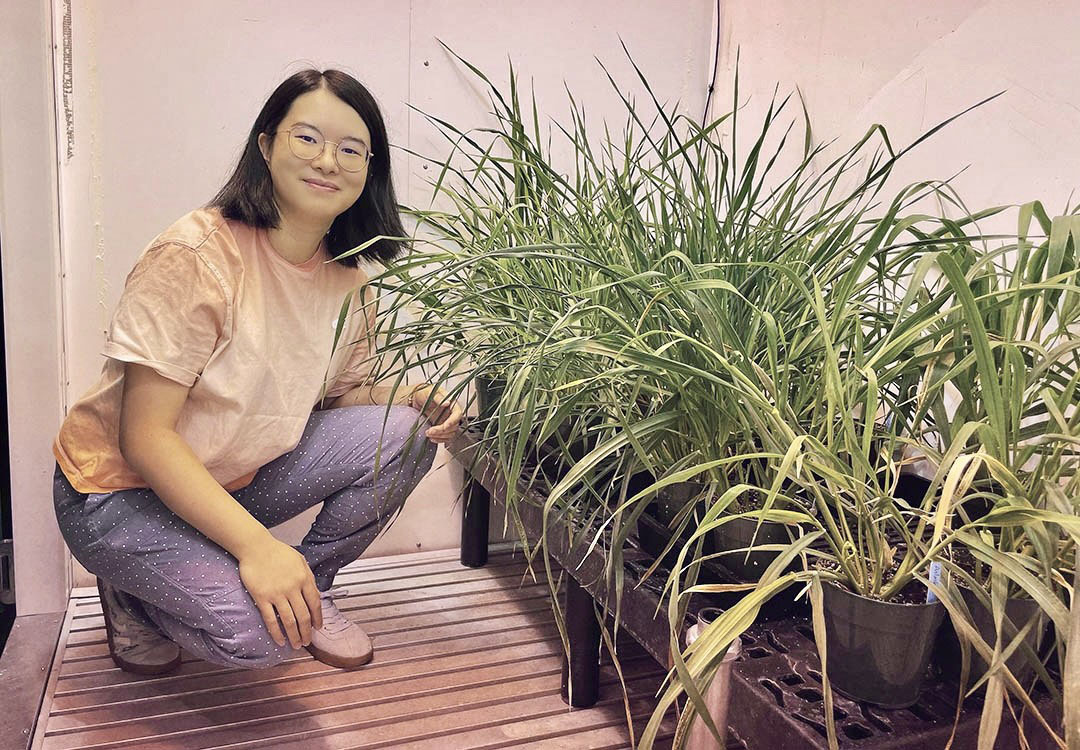
USask graduate investigates gene to improve the health of barley
Fan Yang’s thesis research focused on protecting barley from a common plant disease.
By Brett MakulowichFeeding the world requires healthy crops that can resist plant disease. Barley is the world’s fourth largest cereal crop in terms of production. This important crop is at risk worldwide from the fungus, Ustilago hordei, which infects barley with a disease called covered smut. This fungal infection starts on the surface of barley seed and causes the kernels of the barley plant to be replaced by masses of brown spores.
Fan Yang’s research sought to identify a gene that can prevent barley yield loss from covered smut and thus improve economic returns to farmers.
“My research focused on identifying a resistance gene, called RuhQ, within the barley genome that provides long-term resistance to covered smut,” said Yang. “I investigated how the pathogen infects barley seedlings and reduces grain quality and yield. I also explored which defense pathways are activated by the RuhQ gene to help barley defend against covered smut.”
In July 2025, she successfully defended her PhD thesis, A study of RuhQ-mediated resistance to covered smut (Ustilago hordei) in barley. Yang was supervised by Dr. Aaron Beattie (PhD), associate professor in the Department of Plant Sciences in the College of Agriculture and Bioresources (AgBio). Yang will officially receive her PhD in Plant Sciences at USask Fall Convocation on November 12.
“The Plant Sciences PhD program at the University of Saskatchewan provided me with an exciting opportunity to gain advanced knowledge in plant pathology,” said Yang.

Throughout her PhD she utilized USask’s world class research facilities. These included the Crop Molecular Genetics Lab, the Agriculture Greenhouses, the Phytotron, and the Microscopy Core.
“My research found that the protein structure of the candidate RuhQ is distinct from that of known resistance proteins,” said Yang. “My research also revealed a new infection process associated with the covered smut pathogen. A promising candidate gene for RuhQ was identified along with possible defence-related phytohormone pathways involved in RuhQ- mediated resistance.”
Yang’s research is already being applied in the real world with the USask Crop Development Centre using the RuhQ gene in its barley breeding program. This will help prevent barley yield loss and improve economic returns to farmers in Western Canada.
“Incorporating the RuhQ gene into future barley varieties is especially important to organic farmers who are unable to use chemical-based seed treatments to control covered smut,” said Yang.
Yang received funding from the Saskatchewan Barley Development Commission Scholarship and the Rene Vandeveld Postgraduate Scholarship for her research.
Originally from Yunnan, China, she came to Canada when her husband, Wen Zang, attended USask for his PhD degree. Yang earned her bachelor’s degree in Agronomy (major in Seed Science and Engineering) and master’s degree in Agronomy (major in Crop Genetics and Breeding) from Northwest Agriculture and Forestry University in China. She worked as a research technician at AgBio prior to beginning her PhD program.
“My experience at the University of Saskatchewan has been excellent,” she said. “It’s a supportive research community. I have a wonderful thesis supervisor, professional committee members, and classmates who are helpful and friendly.”
Yang’s future plans include continuing to work with Beattie on research related to RuhQ-mediated resistance in barley.
“I like that research allows me to explore the unknown and that it constantly challenges me to stay curious, think deeply, and critically assess information during the process of finding answers,” said Yang.

